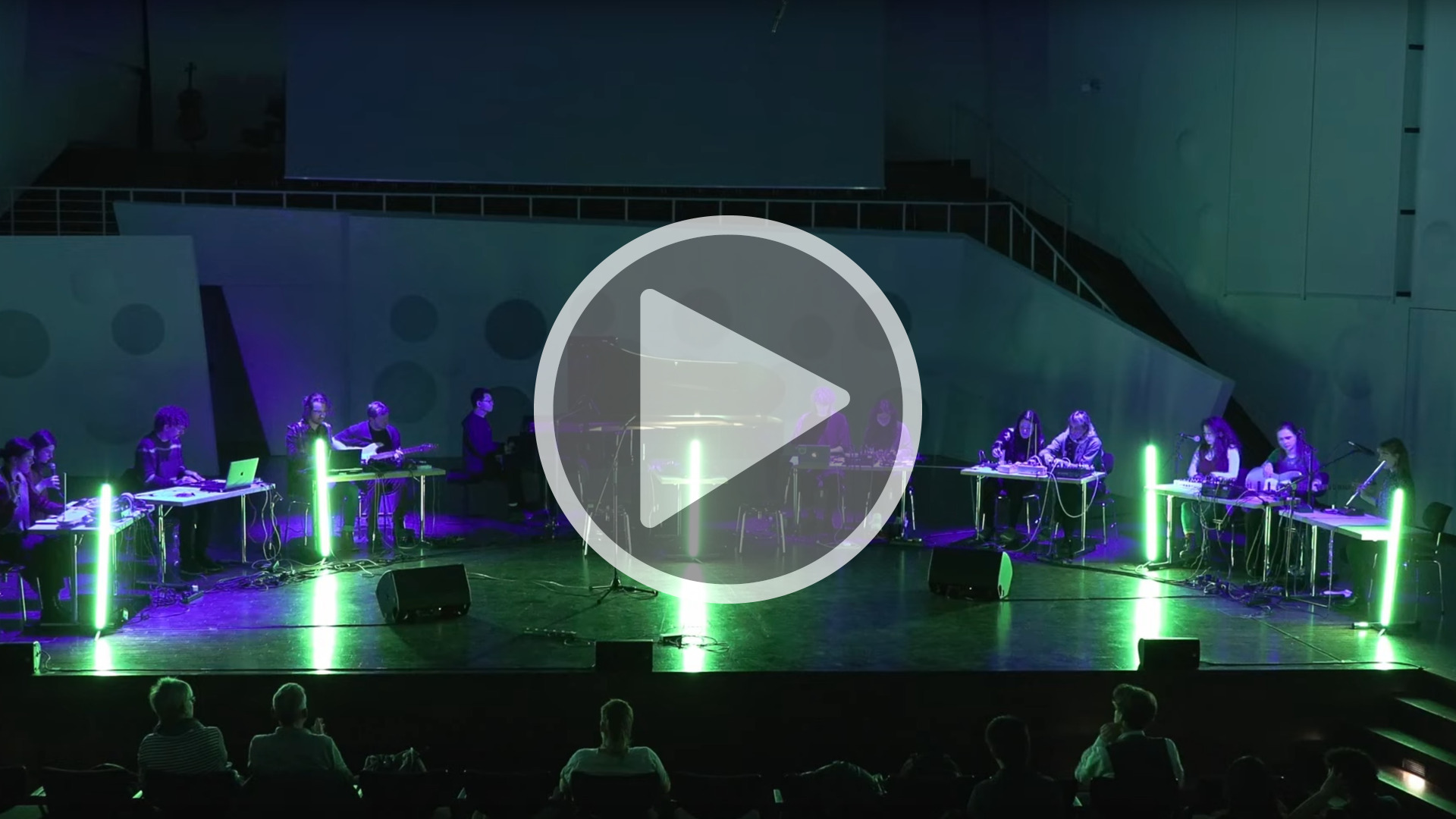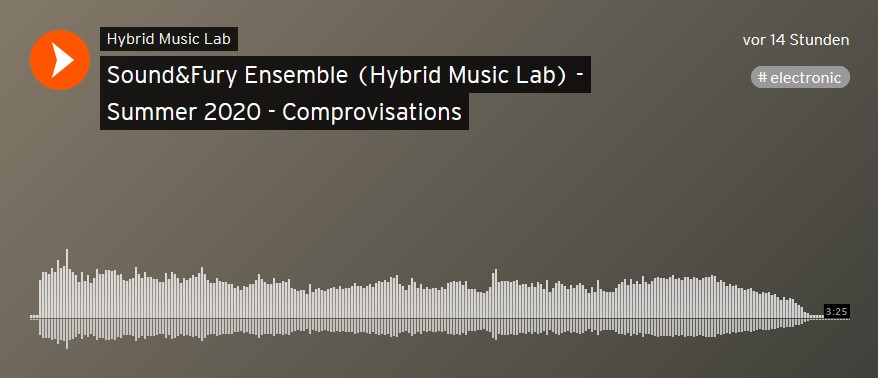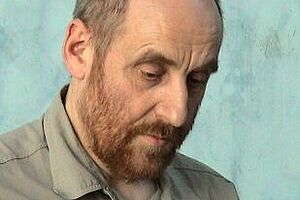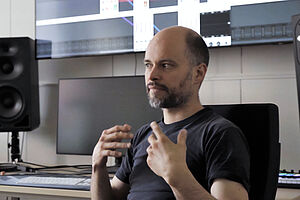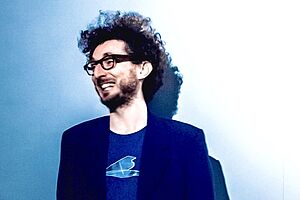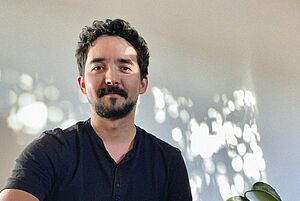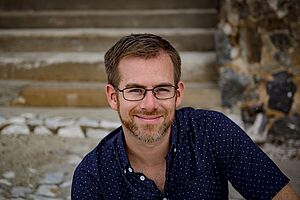Hybrid Music Lab
Together with everyday life, today’s artistic creations are becoming more and more hybrid. They make use of many media, sources and perspectives, different interactions between physical and virtual identities and are presented on different platforms. They are breaking down barriers between different disciplines and presentation models.
The Hybrid Music Lab (former Studio für Elektronische Musik) offers the surroundings, infrastructure and educational context for such musical endeavors.
About
Profile, Equipment and History
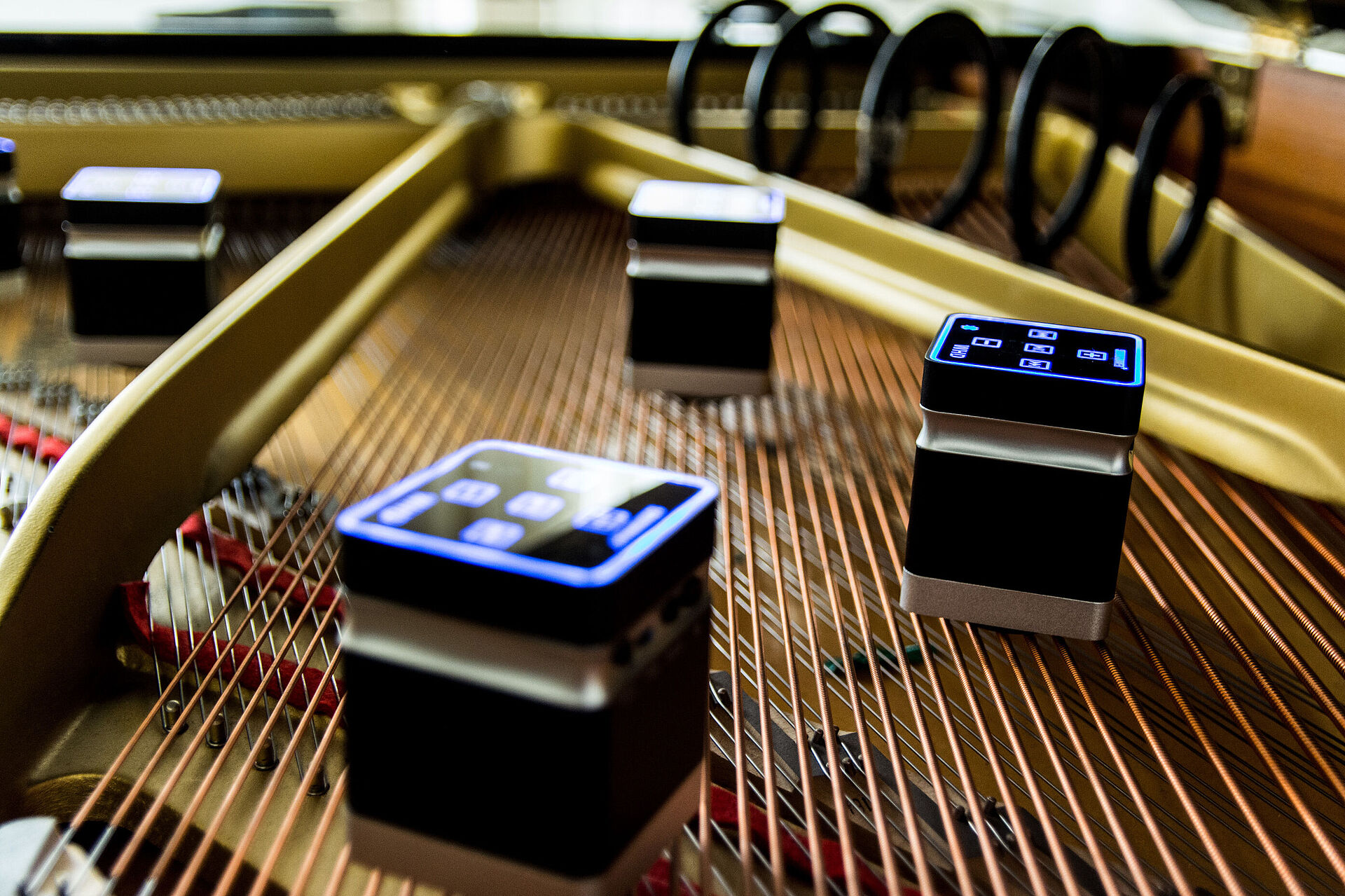
The field of expertise expertise in electronic music is an integral part of the composition studies studies at the Hochschule für Musik Dresden. With teaching hours and student time expense taken into account, this makes it one of the three most important parts of the curriculum – together with individual lessons and elective choices.
![[Translate to Englisch:] Ausstattung Studio Elektronische Musik/Foto: Christoph Mann](https://www.hfmdd.de/fileadmin/_processed_/0/1/csm_SEM-1_Christoph_Mann_9febb5f057.jpg)
The studio offers a a high quality surround monitoring system from Neumann (KH 420 and KH 310) 310) which delivers detailed audio, even for demanding projects. The equipment reflects the constantly changing modern production environment, with regular additions of novel and useful gear.
In 2020 we will be purchasing high-end video and projection gear.
The Lab was founded by Friedbert Wissmann in 1984 as a cooperation between the Hochschule für Musik and the Technische Universität Dresden under the name „Studio für elektronische Klangerzeugung“.
Teaching Digital Music
Funded by the Stiftung für Innovation in der Hochschullehre the project "Music Teaching Digital" was set up at the Hybrid Music Lab in 2021. The aim of the project is the development of a modern curriculum for the integration of new technologies in artistic musical teaching.
Sound & Fury
Ensembleworkshop
Sound & Fury is a transmedial ensembleworkshop, which takes place every two weeks as a seminar with practical applications, to make music using improvisational strategies.
It‘s designed as a non-hierachical „playground“, enabling composers, performers and singers from all parts of the Hochschule (classic, jazz, pop, rock, opera,...) to come together and make intermedual music, using voice, acoustic or analogue instruments, or selfbuilt digital programs and their hybrid forms.
Plattforms
Links to our Online Presence
Profile
Composition Training
During the first two years of study, 0.75 semester-week-hours (SWS) are used for technical and theoretical basics, in form of lecture or seminars. Apart from that, there is individual support throughout the first 3 years of study with 0.75 SWS one-on-one lessons, which focuses on the practical realisation of your own compositions, furthering the knowledge and understanding of the relevant technical aspects. After the first 3 years of study, work can be resumed in the Lab with subject-specific electives in the fourth year.
The Masters programme then offers the possibility to set the individual focus and related project work for electroacoustic composition and offers the possibility to realise that in the Hybrid Music Lab.
Central to the work in the Lab is the understanding of algorithmic, live-electronic as well as place- and media-specific composition techniques. Parallel to that, a tight connection with the compositorial experience of the students in the field of instrumental music is provided. The live-electronic as well as algorithmic approaches are important from the technical perspective as well as the didactic, thus effecting the work outside of the Hybrid Music Lab as well.
Throughout the course of study, the experience of handling the hardware (microphones, speakers, mixers, controller etc.) connects with the knowledge about digital signal processing and the corresponding software environments, with which the creation of your own algorithms and solutions forms an essential focus point. Working on synthesis and transformation programatically this way builds up a basis for individual experimentation.
Apart from that, the Hybrid Music Lab offers a plethora of regular theme-related projects, supports the exchange with the studios of other music colleges and universities, and offers workshops with reknown composers, programmers and performers from the field of electronic music.
Teaching
Below you can find a small overview of events typically taking place in the HML.
Winter Semester
-
Recording, Mixing, Sounddesign
Mi, 10:00 - 11:00Modul-CodesRaumW 3.19 (Hybrid Music Lab)
DozentChristoph Mann
ZeitenMi, 10:00 - 11:00 Uhr
SemesterWS/SS
KommentarPraktisches Wissen über Mikrofone, Platzierung, Aufnahme von sich selbst und anderen in verschiedenen Umgebungen und Räumen. Strategien zur Bearbeitung und Abmischung. Sounddesign mit Standard-Studio-Tools, Equalizer/Filter, Kompressor, Delay-FX. Beinhaltet technisches Gehörtraining und vergleichendes Anhören von Aufnahmen.
WPF fürBachelor Gesang
Bachelor IGP Gesang
Bachelor IGP Klavier
Bachelor IGP Orchesterinstrumente/Blockflöte
Bachelor JRP Akustische Gitarre
Bachelor JRP Gesang
Bachelor JRP IGP Akustische Gitarre
Bachelor JRP IGP Gesang
Bachelor JRP IGP Instrumental
Bachelor JRP Instrumental
Bachelor JRP Komposition
Bachelor Klavier
Bachelor Musiktheaterkorrepetition
Bachelor Musiktheorie
Bachelor Orchesterdirigieren
Bachelor OrchesterinstrumenteFachsemester3, 4, 5, 6, 7, 8
-
Seminar Musik und Digitalität: Digital Produktion Lab
Do, 12:30 - 15:30Modul-CodesMuD g
RaumW 0.03
DozentProf. Sebastian Merk
ZeitenDo, 12:30 - 15:30 Uhr
SemesterWS/SS
KommentarExperimentieren in der Praxis mit… Live Remixing… Instant Compositing/ Improvisation mit Effekten und digitalen Tools, Jammen und Üben, spielerisch produzieren…
Erster Termin: 10.Okt -
Seminar Musik und Digitalität: Theorie der Elektronischen Musik 1
Do, 12:00 - 13:00Modul-CodesEM 1 - K JRP (MA MU)
EM 1 - KT (MA MU)
MuD g
TuH 1 KJRP (BA MU)
WPM TEM 1 (BA MU)
TuH 1 Komp (BA MU)RaumW 3.19 (Hybrid Music Lab)
DozentChristoph Mann
ZeitenDo, 12:00 - 13:00 Uhr
SemesterWS/SS
KommentarLehrt die Produktion elektronischer Musik durch den Aufbau solider Technikkenntnisse von Grund auf. Grundlagen wie analoges und digitales Audio, Signalrouting, MIDI und andere Steuerungsprotokolle. Detaillierter Einblick in Plugins und digitale Signalverarbeitung. Alles über Synthese, spektrale Effekte, Mehrkanal, Granularsynthese. Audioprogrammierung mit MaxMSP und Max4Live.
Pflicht fürBachelor JRP Komposition
Bachelor KompositionFachsemester1, 2
Summer Semester
-
Recording, Mixing, Sounddesign
Mi, 10:00 - 11:00Modul-CodesRaumW 3.19 (Hybrid Music Lab)
DozentChristoph Mann
ZeitenMi, 10:00 - 11:00 Uhr
SemesterWS/SS
KommentarPraktisches Wissen über Mikrofone, Platzierung, Aufnahme von sich selbst und anderen in verschiedenen Umgebungen und Räumen. Strategien zur Bearbeitung und Abmischung. Sounddesign mit Standard-Studio-Tools, Equalizer/Filter, Kompressor, Delay-FX. Beinhaltet technisches Gehörtraining und vergleichendes Anhören von Aufnahmen.
WPF fürBachelor Gesang
Bachelor IGP Gesang
Bachelor IGP Klavier
Bachelor IGP Orchesterinstrumente/Blockflöte
Bachelor JRP Akustische Gitarre
Bachelor JRP Gesang
Bachelor JRP IGP Akustische Gitarre
Bachelor JRP IGP Gesang
Bachelor JRP IGP Instrumental
Bachelor JRP Instrumental
Bachelor JRP Komposition
Bachelor Klavier
Bachelor Musiktheaterkorrepetition
Bachelor Musiktheorie
Bachelor Orchesterdirigieren
Bachelor OrchesterinstrumenteFachsemester3, 4, 5, 6, 7, 8
-
Seminar Musik und Digitalität: Digital Produktion Lab
Do, 12:30 - 15:30Modul-CodesMuD g
RaumW 0.03
DozentProf. Sebastian Merk
ZeitenDo, 12:30 - 15:30 Uhr
SemesterWS/SS
KommentarExperimentieren in der Praxis mit… Live Remixing… Instant Compositing/ Improvisation mit Effekten und digitalen Tools, Jammen und Üben, spielerisch produzieren…
Erster Termin: 10.Okt -
Seminar Musik und Digitalität: Theorie der Elektronischen Musik 1
Do, 12:00 - 13:00Modul-CodesEM 1 - K JRP (MA MU)
EM 1 - KT (MA MU)
MuD g
TuH 1 KJRP (BA MU)
WPM TEM 1 (BA MU)
TuH 1 Komp (BA MU)RaumW 3.19 (Hybrid Music Lab)
DozentChristoph Mann
ZeitenDo, 12:00 - 13:00 Uhr
SemesterWS/SS
KommentarLehrt die Produktion elektronischer Musik durch den Aufbau solider Technikkenntnisse von Grund auf. Grundlagen wie analoges und digitales Audio, Signalrouting, MIDI und andere Steuerungsprotokolle. Detaillierter Einblick in Plugins und digitale Signalverarbeitung. Alles über Synthese, spektrale Effekte, Mehrkanal, Granularsynthese. Audioprogrammierung mit MaxMSP und Max4Live.
Pflicht fürBachelor JRP Komposition
Bachelor KompositionFachsemester1, 2
History
The Lab was founded by Friedbert Wissmann in 1984 as a cooperation between the Hochschule für Musik and the Technische Universität Dresden under the name „Studio für elektronische Klangerzeugung“.
Parallel to the training with electronic keyboard instruments and computers, MIDI software was developed for Commodore C64 and Amiga.
From 1993 until 2006 Prof. Dr. Wilfried Jentzsch led the Studio für Elektronische Musik. During this time, it was aesthetically and pedagogically reoriented. Also, the technical possibilities were modernized, notably the change to Protools and Mac-based software.
In the winter semester 2002/03 the Studio was temporarily led by Lothar Voigtländer, and after that from 2006 until 2008 by Michael Flade.
From September 2008 Prof. Franz Martin Olbrisch took the position as head of the studio, until March 2020.
The studio is currently led by Stefan Prins, and renamed „Hybrid Music Lab“.
Dipl. Ing. Christoph Mann is responsible for audio/video/informatics support, tutorials and research.
Contact
Christoph Mann
Dipl. Ing.
Hybrid Music Lab
Webmaster
Phone: | |
Sprechzeit
Dienstag 12:00-12:30
Stefan Prins
Prof. Dr.
Komposition
Leitung Hybrid Music Lab
Stellvertretender Studiendekan Komposition/Musiktheorie
Phone: | |
Nico Juschten
Mitarbeiter Finanzen
Projekt "Musikalische Lehre Digital"
Phone: | |




